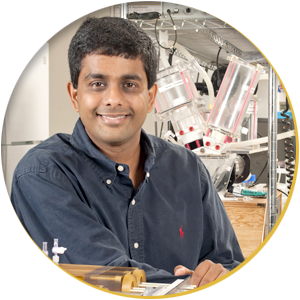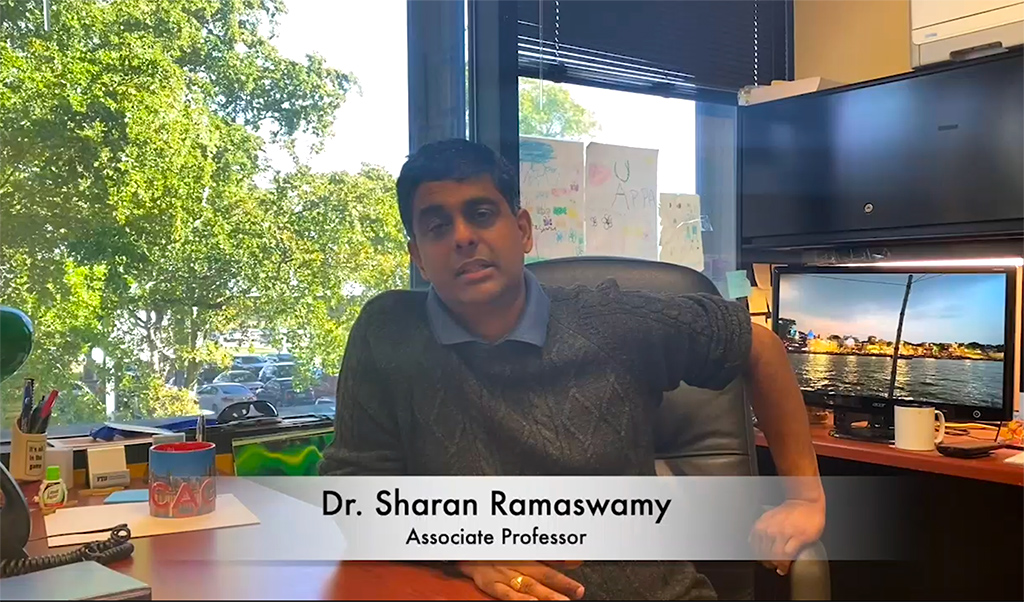 Sharan Ramaswamy, Ph.D., received a National Science Foundation (NSF) Partnerships for Innovation – Technology Translation (PFI-TT) grant. According to NSF, the PFI-TT grant offers researchers the opportunity to transform new knowledge into societal benefits through translational research and technology development efforts, which catalyze partnerships to accelerate innovations that address significant societal needs. Dr. Ramaswamy’s funded innovation project that aims to be scalable, repeatable, and practical, helps regenerate heart muscle through injectable treatments to offer partial restoration of lost heart function. This innovation may facilitate a viable treatment option for patients contraindicated for stent or graft placement, thereby delaying the onset of heart failure. The proposed technology by Dr. Ramaswamy and his team stimulates stem cells using oscillating flow conditions that lead to the secretion of high-quality secretions and exosomes, essentially, a contained cargo of molecular factors that can regenerate heart muscle. These secretions/exosomes will be consolidated in an injectable form for therapeutic delivery to the damaged heart muscle, thereby leading to tissue regeneration and subsequent partial restoration of lost heart function.
Sharan Ramaswamy, Ph.D., received a National Science Foundation (NSF) Partnerships for Innovation – Technology Translation (PFI-TT) grant. According to NSF, the PFI-TT grant offers researchers the opportunity to transform new knowledge into societal benefits through translational research and technology development efforts, which catalyze partnerships to accelerate innovations that address significant societal needs. Dr. Ramaswamy’s funded innovation project that aims to be scalable, repeatable, and practical, helps regenerate heart muscle through injectable treatments to offer partial restoration of lost heart function. This innovation may facilitate a viable treatment option for patients contraindicated for stent or graft placement, thereby delaying the onset of heart failure. The proposed technology by Dr. Ramaswamy and his team stimulates stem cells using oscillating flow conditions that lead to the secretion of high-quality secretions and exosomes, essentially, a contained cargo of molecular factors that can regenerate heart muscle. These secretions/exosomes will be consolidated in an injectable form for therapeutic delivery to the damaged heart muscle, thereby leading to tissue regeneration and subsequent partial restoration of lost heart function.
Stem cell therapy has significant concerns because it is difficult from a quality control standpoint to make repeatable cell batches that have near-identical formulations. Moreover, stem cells directly injected into the damaged heart muscle do not engraft well and only remain viable for a couple of days. Our innovation is based on the simple idea that if the stem cell secretions are what promote repair/regeneration of damaged cardiac tissues, let us focus on isolating and optimizing these secretions from the stem cells rather than on the cells themselves, and as a non-living biologic, also facilitate the repeatability/scalability of these secretions, thereby accelerating their regulatory approval to the clinic, said Sharan Ramaswamy, Ph.D. about the project.
Graduate and undergraduate BME students have been part of this innovative project and supported the team with their knowledge. Ph.D. student Manuel Perez has worked with Dr. Ramaswamy from the beginning of the idea and will now serve as a 100% committed RA on the NSF: PFI-TT project. Yih-Mei Lin, also another Ph.D. student, led the preliminary data collection work on the stem cell-derived exosomes, and she continues supporting the research.
The idea of the technology started more than four years ago when Ramaswamy, Ph.D., and his FIU BME department team formed with Michael Christie Ph.D., and graduate student Manuel Perez, who received the NSF I-Corps grant and subsequently collectively participated in the I-Corps program whose findings revealed a severe need in cardiovascular medicine for repeatable and scalable innovations founded on stem cell properties that could promote tissue regeneration.
Then, with an already patented Flow-Stretch-Flex bioreactor device that can stimulate stem cells under flow, stretch and flex states individually or in any combination, the team investigated mechanical environments using human bone marrow-derived stem cells and determined that flow-alone with oscillations in the flow, served to permit the stem cells to secrete cardiovascular-relevant molecular cargo.
Focusing on the NSF-PFI: TT proposal, the Dr. Ramaswamy’s group is working on identifying the oscillatory flow conditions that would yield the best molecular cargo in the stem secretions to regenerate cardiac tissues. Once prototyped, the efficacy of this optimized cargo in an injectable form within an in vitro cardiac engineered tissue model system framework will be evaluated, for proof-of-concept. Furthermore, the team is working closely with an industry leader in the cell-based therapy space to identify how they may make their innovation repeatable and scalable in terms of manufacturing.
The NSF:I-Corps and NSF-PFI: TT grants have changed the way Dr. Ramaswamy focuses on his research and he encourages students to dig into the purpose of entrepreneurial science.
If you have an idea that could have a commercial and/or social impact, before you go further, talk to various people in customer segments that you initially hypothesize may have needs/pains that lie within the scope of your area of work. Do not tell them about your idea, but instead listen to their needs. As with science, once you have talked to several people, you may observe a “trend in the data.” At that point, align your idea to that trend, prepare a prototype, and now go back to those same people and see if your prototype meets their needs. It may be obvious, but you need to follow the data and not your feelings/opinions through this process. As they say in I-Corps, you need to fall in love with the problem, not the solution!”. The “data” you need lies- outside of the building and so, dialogue needs to occur outside of classrooms and with non-academics, expressed Dr. Ramaswamy.

